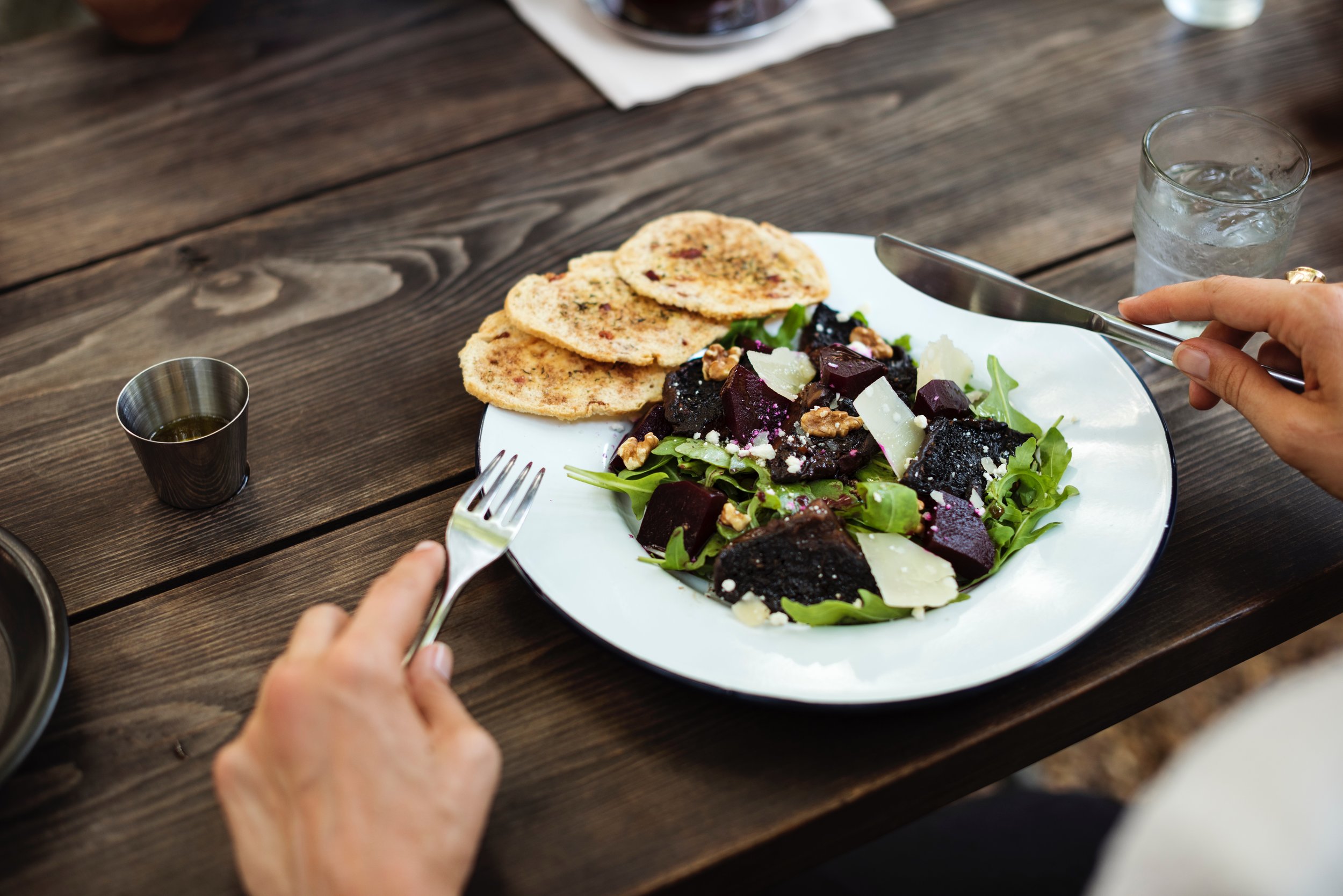So, What is Eating Competence? (Part 2)

Eating competence has played a monumental role in changing the way I view health and eating. If you read Part 1 of my blog (“Are You A Competent Eater?”) and you’re interested in hearing more about what eating competence really is, you’re in the right place! Summarizing a research-based eating model that has taken years to develop and test is no easy task, so check out Satter’s book if you’d like to know more!
Here are some of the key points to eating competence and what they mean:
Eating competence is all about a balance between permission and discipline. Permission means that you allow yourself to enjoy food, seek out good-tasting food and trust yourself to eat as much as you need. The discipline side is referring to the discipline required to faithfully feed yourself and listen to your body while you eat.
It’s important to note that the discipline component is a positive discipline. It’s not about having a set of rules for yourself to eat at certain times, only eat certain things, etc. It simply means being reliable about feeding yourself and taking the time to plan meals and snacks that are satisfying to you. A happy balance between these two ideas results in freedom to enjoy food while being able to go about your day feeling secure knowing that you will be fed and nourished.
Feeling positive about eating means that you are free to enjoy food, even celebrate it! Eating is a marvelous experience and should be accompanied by feelings of pleasure and joy, not punishment or guilt. It’s OK to eat, it’s OK to eat enough to feel full, it’s OK to eat what you enjoy, and it’s OK to take time to eat! I’ll admit that developing this kind of accepting attitude toward myself and eating has been a difficult process – one that I’m still working on. But I can tell you that the more positive I feel about eating, the healthier I am – mentally, emotionally, and physically.
Trusting yourself to eat enough for you means that you do not put restrictions or rules on how much you eat. You listen to your body and rely on internal regulators for that. (After all, your body has all the tools it needs for regulating hunger and fullness. Pretty cool, huh?) This can be a tough one for many people to swallow. Trust myself and listen to my body instead of following rules? But I’ll just eat ice cream all day and become unhealthy! This is the great part about trusting and listening to your body- you will learn that your body craves what it needs and you will be more inclined to enjoy a variety of foods in a balanced manner. When restrictions are lifted, you are free to listen to what your body really needs, and I can guarantee it won’t just be ice cream that you desire all day, every day. (Although let me be clear: a nice big helping of ice cream is still a wonderful part of a healthy diet!)
Feeding yourself faithfully means that you nourish your body and plan to feed yourself. This is the part that takes that positive discipline we talked about. If you go all morning without eating, you’ll likely run out of steam and then for lunch grab the first thing in sight, whether it’s what you really wanted or not.
You are worth taking care of, so take care of your body by planning regular meals and snacks for yourself. When you know that you have reliable mealtimes planned throughout the day, you will be surprised with how peaceful and enjoyable eating can be. Plan ahead, think about the foods you love, shop for them and have them available so you can be fed and nourished throughout your day.
All of these principles meld together to form a peaceful, enjoyable, healthy relationship between you and food in your everyday life. Like I said, learning to be a competent eater is a process, but every step along the way is rewarding. As a diet-crazed society we’ve lost our way somewhere between the low-fat and the low-carb aisles. It’s time we find our way back to just being normal with food. To be a normal eater is to be a competent eater.
Check out Ellyn Satter’s definition of “normal eating”:
"Normal eating is going to the table hungry and eating until you are satisfied.
Normal eating is being able to choose food you like and to eat it and truly get enough of it-not just stopping because you think you should.
Normal eating is being able to give some thought to your food selection so you get nutritious food, but not being so wary and restrictive that you miss out on enjoyable food.
Normal eating is sometimes giving yourself permission to eat because you are happy, sad, or bored, or just because it feels good.
Normal eating is mostly three meals a day-or four or five-or it can sometimes be choosing to munch along the way.
Normal eating is leaving some cookies on the plate because you know you can have some again tomorrow, or eating more now because they taste so wonderful.
Normal eating is overeating at times-feeling stuffed and uncomfortable. And it can be undereating at times and wishing you had more.
Normal eating is trusting your body to make up for your ‘mistakes' in eating.
Normal eating takes up some of your time and attention but keeps its place as only one important area in your life.
In short, normal eating is flexible. It varies in response to your hunger, your schedule, your proximity to food, and your feelings.”
(Ellyn Satter, “Secrets of Feeding a Healthy Family, Figure 2.1)
(If you’d like to learn more about this topic, there are some good resources out there. Secrets of Feeding a Healthy Family, by Ellyn Satter, is a great place to start to learn more about these freeing, healthy principles.)
Hannah lives in Reno, Nevada with her beloved husband and 3 children. After struggling with disordered eating during adolescence, Hannah discovered healthy approaches to body-image, food, and exercise during her studies in the Nutrition department at California State University, Chico. Hannah has a heart for sharing the freeing principles of body acceptance with everyone she meets, especially other moms. She is excited to raise her daughter to know that each and every person is made beautifully in God's image and He wants us to revel in the awe of that beauty every day. Hannah loves spending her time running around with her kids, cooking for her family, practicing Pilates, and cultivating her love of photography.





